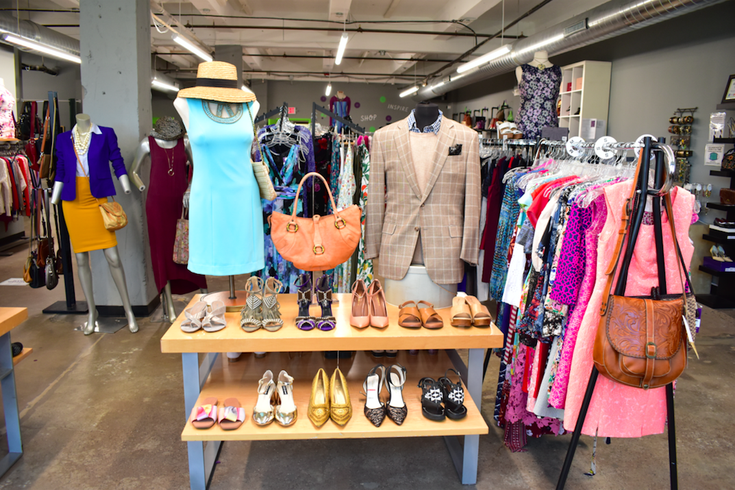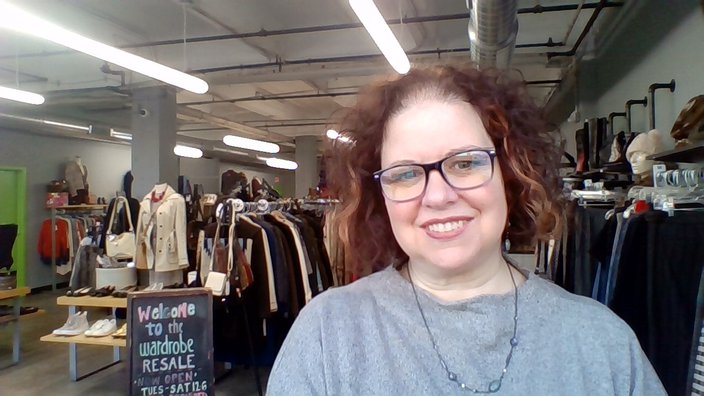
April 14, 2022
 Courtesy/The Wardrobe
Courtesy/The Wardrobe
Dressing well can boost confidence, improving mental health. Above, a display at The Wardrobe, a Philadelphia nonprofit that provides clothing for people in need.
The COVID-19 pandemic has caused many people to rethink how they dress, which, in turn has led them to consider a basic question: What purpose do clothes serve?
They obviously contribute to physical health by providing protection from the elements (and, for many parents, Lego bricks). But they also can contribute to mental health in numerous ways, some of which aren't widely considered.
For example, some people find buying clothes and choosing their outfits every morning to be frustrating. But even for them, the fact that they're able to do those things can be reassuring, because it means they have the ability to control the image they present to the world.
"For people who are clothing insecure, that is a level of choice that is not available," said Sharrona Pearl, an associate professor of bioethics and history at Drexel University.
One Philadelphia nonprofit that tries to give them that level of choice is The Wardrobe.
Founded as The Career Wardrobe in 1995, it originally focused on providing professional clothing to women who were entering or re-entering the workforce due to the changes to federal welfare policy made during the Clinton presidency. It has since expanded its scope, first to serve men and women returning to society after being incarcerated, then to provide all types of clothes to anyone who is having trouble affording them.
The Wardrobe also has opened the locations where it serves clients to the general public, effectively turning them into tri-purpose thrift stores, as they also accept clothing donations. Doing that has increased both the quantity and quality of the clothes The Wardrobe receives, according to its executive director, Sheri Cole, who said the charity gets about 20 times the amount of clothes it can sell and give away.
That's important, Cole said, because it enables The Wardrobe to let its clients select clothes they feel good about.
"The last thing we want is for a client to come in and feel like, 'They only have two things in my size, so I guess I have to take this thing even if it's not suitable for me,'" she said.
"Our job is to make someone feel like they've come into Nordstrom."
Sheri Cole is the executive director of The Wardrobe, a Philadelphia nonprofit that offers all types of clothing to people who are struggling to afford them.
Not everyone wants to go into Nordstrom, however. For some people, shopping for clothes can be stressful.
Josh Wilton is a good example. In a corporate career of more than 20 years, he wore dark suits, limiting his daily fashion choices largely to picking ties. As a result, when he became an entrepreneur, Wilton had neither a suitable wardrobe nor clothes-shopping skills.
"My ability to shop consisted of going out with good intentions to get clothing and then buying a pair of khakis and a blue shirt which I already had," said Wilton, who is now a co-owner of Queenston Realty, Princeton Abstract and Princeton Property Management Services, all of which are based in Princeton, N.J.
To overcome that liability, Wilton turned to image consultant Gregory Jerome, who was one of four runner-up prize winners in the 2020 Rise Up Philly Entrepreneurship Hackathon, a Jefferson University startup contest focused on creating economic opportunity in communities of color.
Thanks to Jerome, Wilton said, he now has a collection of clothing whose components all go with each other, enabling him to effortlessly look good every day.
"This morning, I put on shoes, a sweater, both of which I never would have picked out, a white shirt I owned, a blue blazer and a pocket square he picked out for me," Wilton said during a phone interview on a recent morning. "I've only seen four people and I've gotten four compliments on my clothes."
Getting compliments because of your clothes is an obvious way that what you wear can affect your mental health.
"I don't know a single person who, when they look nice and they go out and receive a compliment from a friend or date, doesn't feel better about themselves," said Drew Lightfoot, the Philadelphia-area clinical director for Thriveworks, which provides mental health counseling online and through 310 locations nationwide.
In addition to making people think you have a good sense of fashion, your clothes also can affect how people perceive you.
That concept goes at least as far back as Shakespeare, whose character Polonius proclaimed in The Tragedy of Hamlet that "The apparel oft proclaims the man."
The idea that clothing could help people succeed professionally took off in the 1970s thanks to two books by John T. Molloy — "Dress for Success" and "Women's Dress for Success," which Molloy said contained the results of research showing that people formed opinions of other people's professionalism and competence based on how they dressed.
Knowing that people perceive you're capable of doing something can boost your confidence in your ability to do it, which can enable you to do it less stressfully and therefore better. That, in turn, can help your mental health.
More surprisingly, researchers have found that how you dress can affect your perception of yourself in a way that boosts your performance, which could improve your mental health by increasing your self-confidence and reducing the amount of stress your job causes.
In a study published 10 years ago, two Northwestern University researchers first determined that people associate wearing a lab coat with attentiveness and carefulness. They then had people wearing lab coats and people not wearing lab coats perform tasks and found that "physically wearing a lab coat increased selective attention compared to not wearing a lab coat." They also found that "wearing a lab coat described as a doctor's coat increased sustained attention compared to wearing a lab coat described as a painter's coat."
Of course, these days, most people are less concerned with whether they should wear lab coats and more concerned with how, or even if, to alter their wardrobes to accommodate the extra pounds they put on during the pandemic.
"People are dealing with body issues," Jerome said.
That can cause them to feel bad about themselves, making them less likely to feel like buying new clothing, especially if the new clothing has to be in larger sizes.
For such people, Jerome has a simple message, but one that befits an image consultant.
"I tell people, 'Why not look good at the size that you're at?'" he said.
"Let's find the perfect style for who you are now, and, as you transition, do your clothes."
 Courtesy/The Wardrobe
Courtesy/The Wardrobe